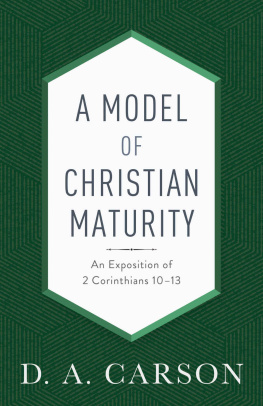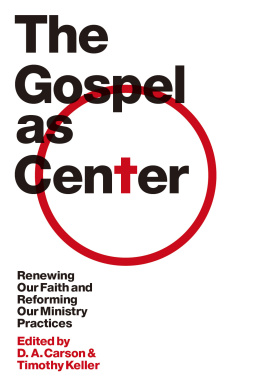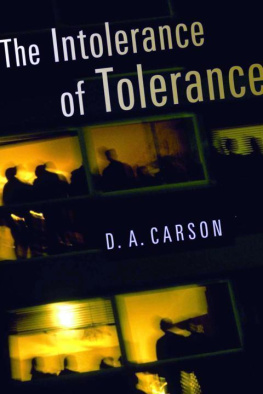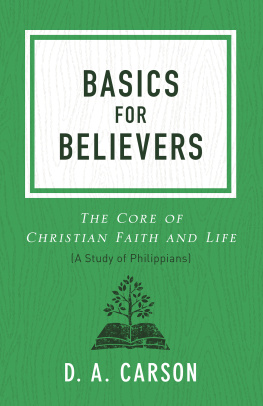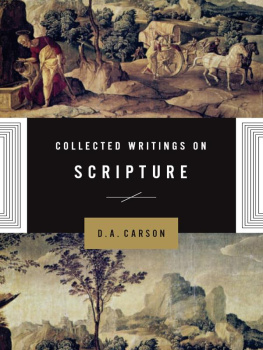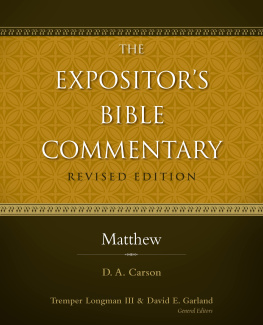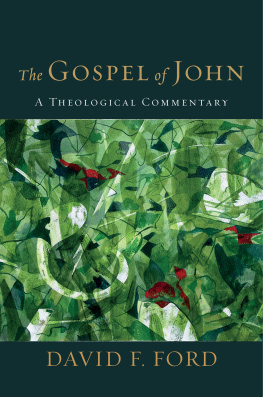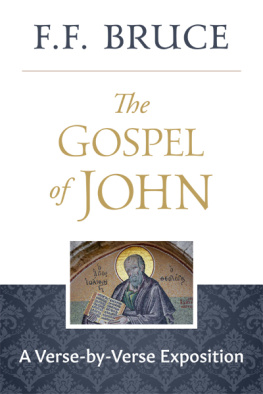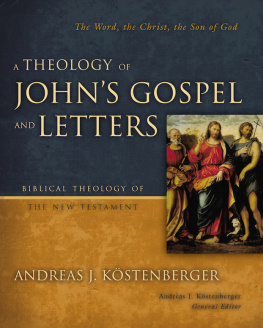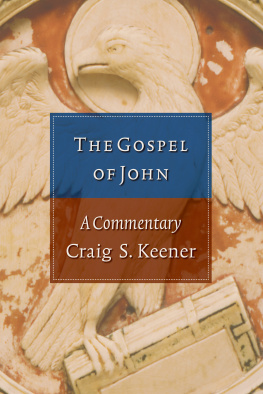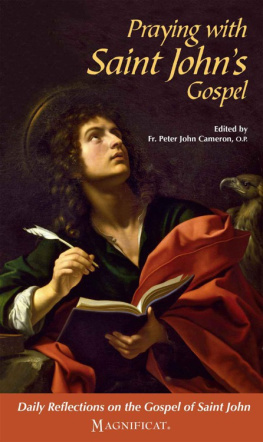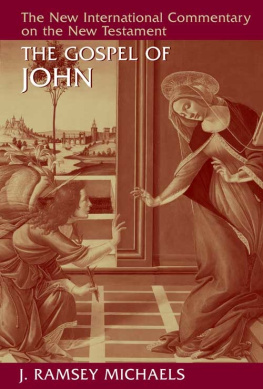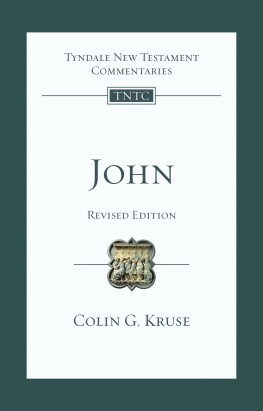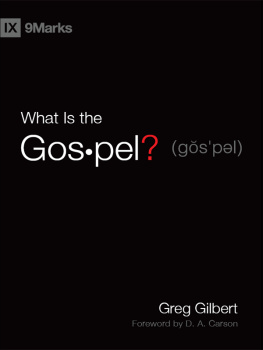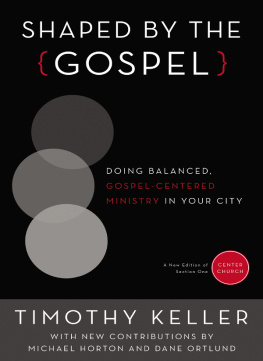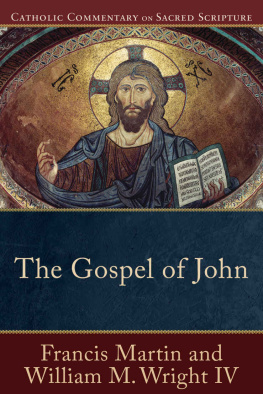Table of Contents
THE PILLAR NEW TESTAMENT COMMENTARY
General Editor
D. A. CARSON
This book is gratefully dedicated to
Kenneth and Ruth Kantzer
1991 D. A. Carson
All rights reserved. No part of this publication may be reproduced,
stored in a retrieval system, or transmitted, in any form or by any means,
electronic, mechanical, photocopying, recording or otherwise, without the
prior permission of the publishers or the Copyright Licensing Agency.
Published 1991 in the U.K. by
APOLLOS (an imprint of Inter-Varsity Press)
38 De Montfort Street, Leicester, England LE1 7GP
and in the United States by Wm. B. Eerdmans Publishing Company
255 Jefferson S.E., Grand Rapids, Michigan 49503
Printed in the United States of America
04 03 02 01 00 99 12 11 10 9 8 7 6
British Library Cataloguing in Publication Data
Carson, D. A.
The gospel according to John.
1. Bible. N.T. John Critical studies
I. Title
226.506
ISBN 0-85111-779-X
Eerdmans ISBN 0-8028-3683-6 (cloth: alk. paper)
Unless otherwise stated, Scripture quotations in this publication are from the Holy Bible, New International Version. Copyright 1973, 1978, 1984 International Bible Society. Used in USA by permission of Zondervan Bible Publishers, Grand Rapids, Michigan, and published in Great Britain by Hodder and Stoughton Ltd.
SERIES PREFACE
Commentaries have specific aims, and this series is no exception. Designed for serious pastors and teachers of the Bible, the Pillar commentaries seek above all to make clear the text of Scripture as we have it. The scholars writing these volumes interact with the most important informed contemporary debate, but avoid getting mired in undue technical detail. Their ideal is a blend of rigorous exegesis and exposition, with an eye alert both to biblical theology and the contemporary relevance of the Bible, without confusing the commentary and the sermon.
The rationale for this approach is that the vision of objective scholarship (a vain chimera) may actually be profane. God stands over against us; we do not stand in judgment of him. When God speaks to us through his Word, those who profess to know him must respond in an appropriate way, and that is certainly different from a stance in which the scholar projects an image of autonomous distance. Yet this is no surreptitious appeal for uncontrolled subjectivity. The writers of this series aim for an evenhanded openness to the text that is the best kind of objectivity of all.
If the text is Gods Word, it is appropriate that we respond with reverence, a certain fear, a holy joy, a questing obedience. These values should be reflected in the way Christians write. With these values in place, the Pillar commentaries will be warmly welcomed not only by pastors, teachers, and students, but by general readers as well.
PREFACE
Anyone who dares to write yet another commentary on the Gospel of John must give reasons for doing so.
The original impetus was the invitation to provide a volume for a series. But as I set to work, it became clear that I needed more reason than that. A new commentary needs to justify itself in broader terms: it needs to carve a niche for itself by aiming at a specific readership, or by tackling certain problems, or by its particular emphases.
As these matters were discussed with the publishers, both they and I originally thought that the extra length and detail my own aims demanded could be accommodated within the series. Eventually, however, it was thought otherwise, and so we amicably agreed to publish this commentary on its own. This history largely explains why the format of this work is as it is.
This commentary seeks above all to explain the text of Johns Gospel to those whose privilege and responsibility it is to minister the Word of God to others, to preach and to lead Bible studies. I have tried to include the kind of information they need to know, but to do so in such a way that the informed layperson could also use the work in personal study of the Bible, exclusively for purposes of personal growth in edification and understanding.
In particular, I have attempted:
(1) To make clear the flow of the text. Instead of offering detailed word studies and comments on Greek syntax, I have kept such remarks to the minimum required to make sense of the book, and have focused on the movement of thought.
(2) To engage a small but representative part of the massive secondary literature on John. Doubtless many who read this commentary will be informed pastors and theological students who need some kind of map of contemporary studies on John. Without permitting such interaction to become intrusive, I have tried to indicate what is valuable in such work, and where (and why) I depart from some of it.
(3) To draw a few lines towards establishing how the Fourth Gospel contributes to biblical and systematic theology. There is, of course, no point in deriding such syntheses; any thinking Christian is in some sense a systematician. But if all of us consciously or unconsciously systematize what we learn from the Scriptures, it may be a help to pause now and then in the course of an exegetical and expository commentary and reflect on the contribution of the text to a mature and holistic Christian faith.
(4) To offer a consistent exposition of Johns Gospel as an evangelistic Gospel. This is out of step, I confess, with what is in vogue in current scholarship: the majority opinion understands the Fourth Gospel to have been written with Christian readers in mind. In the past I have written the odd article poking away at this synthesis, trying to establish the minority opinion; but this commentary attempts, in part, to provide a global (if still entirely preliminary) defence of this reading.
No-one is more aware than I how far I have proved unable to achieve these goals as I would have liked. I am grateful for the careful reading and thoughtful suggestions of Leon Morris and David Kingdon. That I have not always agreed with them must not detract from the fact that because of their wisdom and attention to detail this work is better than it would have been without them. I am also grateful to the publishers, not least for their continued enthusiasm for the work even when it became clear that it could not be accommodated within the series for which it was originally planned. Finally, I want to express my thanks to Steve Bryan for compiling the Scripture index.
Above all, if this commentary helps some to honour the Son just as they honour the Father (5:23), and to believe that the Christ, the Son of God, is Jesus (20:3031), and thus to discern both the love (3:16) and the wrath (3:36) of God that have been brought near in the coming of the Son, I shall be profoundly grateful.
Soli Deo gloria.
D. A. Carson
ABBREVIATIONS


